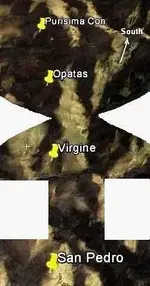Cactusjumper wrote
Good Morning Roy,
I don't take all "treasure stories" as Gospel, no matter who the source is.
I believe Springfield has hit the nail on the head in placing the Indian revolts at the feet of RELIGION. Most of that trouble was caused by a resentment of the new religion being forced on the natives. Forcing out the old beliefs and ways of living was a primary contributor to the conflicts.
That opinion is based on what I have read. Others may have come to another conclusion, which I have no real problem with. After all, I used to believe the same thing.
The Jesuit Fathers wrote of many mines around the missions. It does not follow that those mines belonged to the Order.
I have written many times about mines. None of them belonged to me. The Bully Bueno comes to mind as one of them. Spanish mines were an important source of income and security to the Jesuits. They took care of the Miner's needs, as well as the Indians.
Treasure stories are not enough to make me believe in Jesuit mining.
Well, I used to believe that ALL stories of lost treasures and mines were so much bunkum. My point about the treasure stories originating from Indians formerly under Jesuits was that you choose to dismiss them out of hand, while espousing that you have high respect for Amerindians.
Notthat the stories alone would ever convince you of anything.
I have a simple question for you Joe:
Do you believe that the Jesuits owned and operated mines in the southwest?
As to the causes of the 1680 Pueblo revolt - here is an extract:
In 1680 came the great revolt of the Pueblo Indians. The Indians blamed the operation of the mines for the condition of practical slavery to which they were reduced by the Spaniards
< from the New Mexico Blue Book or
State Official Register, 1919, pp 50>
I have no doubt that the religion was
a main cause, however to dismiss the mines and ensuing enslavement is helping those whom are trying to whitewash the history of the missionaries. There was a reason why the Pueblos included the demand that the padres restrict their activities to agricultural pursuits as a condition of peace in 1692.
Before this goes off onto New Mexico entirely, perhaps it is enlightening to remember that the founder of the colony, Juan de Onate, requested six new Royal brands for use on silver bars to be exported from the new territory soon after establishing his capital. There would not have been any need for such brands to mark bars, if there were no mines. Even the two Franciscan priests killed prior to Onate's entrada, reportedly discovered eleven silver mines. Word of the rich silver mines of New Mexico reached all the way to the royal court of France and to the Jesuits operating in New France. Most if not all historians have little or nothing to say about the missionaries mining activities because
they do not look for that. In fact this is a topic of debate only in our world of treasure hunters. Historians simply don't care about it.
One last point here, but considering that we have been able to find plenty of documentary evidence, including from Catholic sources, that the missionaries were mining, and such highly respected historians as father Polzer seemingly failed to find or deliberately withheld, I don't see good reason to continue to put any trust and faith in any Jesuit source that pretends that the Order never had any mines or never enslaved the Indians. They have a vested interest in covering up the truth.
Good luck and good hunting amigos, I hope you find the treasures that you seek.
Oroblanco






